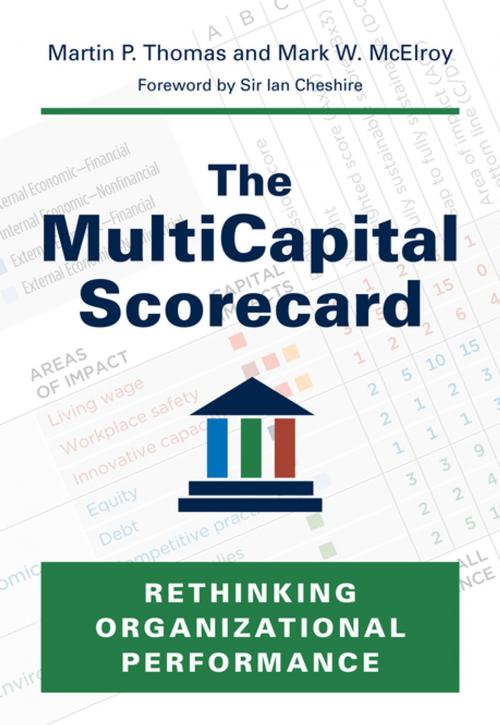The MultiCapital Scorecard
Rethinking Organizational Performance
Business & Finance, Economics, Sustainable Development, Business Reference, Business Ethics| Author: | Martin P. Thomas, MA, MSc, FCMA, FCIS, CGMA, Mark W. McElroy, Ph.D. | ISBN: | 9781603586917 |
| Publisher: | Chelsea Green Publishing | Publication: | December 1, 2016 |
| Imprint: | Chelsea Green Publishing | Language: | English |
| Author: | Martin P. Thomas, MA, MSc, FCMA, FCIS, CGMA, Mark W. McElroy, Ph.D. |
| ISBN: | 9781603586917 |
| Publisher: | Chelsea Green Publishing |
| Publication: | December 1, 2016 |
| Imprint: | Chelsea Green Publishing |
| Language: | English |
For decades now, organizations have been struggling to find the best way to address their social and environmental responsibilities alongside their economic obligations. In other words, they want to know how best to effectively manage their operations based on a triple bottom line (3BL)—one that reflects social, environmental, and economic performance.
Recently, an international standard for integrated reporting has emerged that in principle emphasizes the importance of managing toward a triple bottom line. But it fails to provide specific guidance on how to do so. Organizations have been left to their own devices to respond. How should 3BL management actually be done?
In this book, sustainability and performance experts Martin Thomas and Mark McElroy introduce the world’s most advanced 3BL performance accounting methodology: The MultiCapital Scorecard. It is the first* context-based* integrated measurement, management, and reporting system. And, it can help corporations, public institutions, and other organizations answer the question they should be asking themselves for every aspect of their operations: “How much is enough for us to be sustainable?” The answers set internal performance standards against which operations and their impacts can be measured. Nothing less will do!
The MultiCapital Scorecard describes this open-source methodology, which consists of a structured, quantitative measurement and reporting system that complies with international standards for 3BL integrated measurement and reporting. Moreover, the MultiCapital Scorecard is designed to help organizations assess their own 3BL performance in their own contexts with context-based metrics of their own choosing. An eminently practical management aid for integrated thinking, it can be tailored to any organization’s needs.
The authors also describe how and why businesses are gradually shifting from managing impacts on only one type of capital (economic) to managing impacts on multiple types. They also provide detailed examples of worked reports, showing how organizations might develop and quantify the interim and long-term goals to meet their obligations to their employees, community, shareholders, and the environment. The examples also show how an organization can use the Multicapital Scorecard methodology to assess their progress in meeting those goals, and convey that progress to their stakeholders.
For decades now, organizations have been struggling to find the best way to address their social and environmental responsibilities alongside their economic obligations. In other words, they want to know how best to effectively manage their operations based on a triple bottom line (3BL)—one that reflects social, environmental, and economic performance.
Recently, an international standard for integrated reporting has emerged that in principle emphasizes the importance of managing toward a triple bottom line. But it fails to provide specific guidance on how to do so. Organizations have been left to their own devices to respond. How should 3BL management actually be done?
In this book, sustainability and performance experts Martin Thomas and Mark McElroy introduce the world’s most advanced 3BL performance accounting methodology: The MultiCapital Scorecard. It is the first* context-based* integrated measurement, management, and reporting system. And, it can help corporations, public institutions, and other organizations answer the question they should be asking themselves for every aspect of their operations: “How much is enough for us to be sustainable?” The answers set internal performance standards against which operations and their impacts can be measured. Nothing less will do!
The MultiCapital Scorecard describes this open-source methodology, which consists of a structured, quantitative measurement and reporting system that complies with international standards for 3BL integrated measurement and reporting. Moreover, the MultiCapital Scorecard is designed to help organizations assess their own 3BL performance in their own contexts with context-based metrics of their own choosing. An eminently practical management aid for integrated thinking, it can be tailored to any organization’s needs.
The authors also describe how and why businesses are gradually shifting from managing impacts on only one type of capital (economic) to managing impacts on multiple types. They also provide detailed examples of worked reports, showing how organizations might develop and quantify the interim and long-term goals to meet their obligations to their employees, community, shareholders, and the environment. The examples also show how an organization can use the Multicapital Scorecard methodology to assess their progress in meeting those goals, and convey that progress to their stakeholders.















